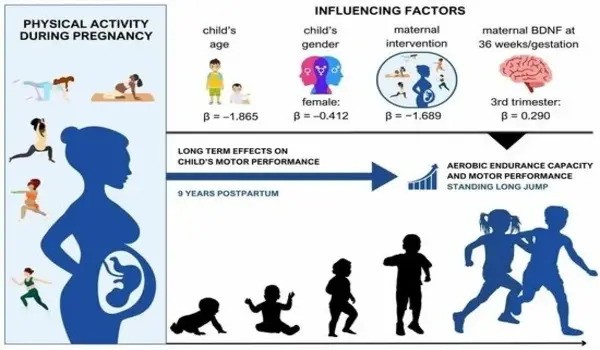According to a new study conducted by the University of Eastern Finland (UEF), Kuopio University Hospital (KUH), and the Finnish Institute for Health and Welfare (THL), the risk of asthma in the child can be reduced by nearly half if the mother engages in active physical exercise at least three times per week during pregnancy. The researchers used data from roughly 1,000 mother-child pairings in the Kuopio Birth Cohort study, which tracked the kid from pregnancy to seven years old.
Maternal activity during pregnancy has been shown to improve the health of both the mother and the child. In a prior study, maternal exercise during pregnancy was similarly linked to improved neonatal lung function.
“This is the first time we are observing an association between maternal exercise and the development of asthma in the child,” says Doctoral Researcher Emma-Reetta Musakka, BM, MSc, of the University of Eastern Finland.
Our findings strongly suggest that maternal exercise during pregnancy has an independent positive effect on the foetus and on the later health of the child. We don’t yet know why maternal exercise manifests as a reduced risk of asthma in the child, but one possibility is that it supports foetal lung maturation.
Emma-Reetta Musakka
Association of exercise with reduced risk of asthma in the child was independent of other maternal health, lifestyle and environmental factors
Maternal activity and child asthma risk are linked to many of the same health, lifestyle, and environmental factors, including maternal weight, stress, illness, family exercise habits, nutrition, and, for example, dog ownership. The current study took into account the potential impact of these and other comparable factors on the results, but it did not explain the beneficial link between maternal activity and the risk of asthma in the kid.
“Our findings strongly suggest that maternal exercise during pregnancy has an independent positive effect on the foetus and on the later health of the child,” Musakka says.
Maternal exercise is known to affect foetal activity and foetal breathing movements, which support lung development.
“We don’t yet know why maternal exercise manifests as a reduced risk of asthma in the child, but one possibility is that it supports foetal lung maturation,” Musakka notes.

Asthma is the most common chronic illness in children- some cases would be preventable
“Until today, avoidance of cigarette smoke during pregnancy has been among the only effective ways to reduce a child’s risk of asthma. Thus, it is intriguing that moderate maternal exercise during pregnancy may have an equally strong protective effect on a child’s asthma risk as if one of the parents quits smoking,” says Dr Pirkka Kirjavainen, the lead researcher of the study.
The results did not show that increasing the quantity of exercise beyond three times per week was connected with a lower risk of asthma. However, further study is needed to determine the significance of exercise frequency and intensity during pregnancy in asthma prevention. The World Health Organization (WHO) recommends that pregnant women engage in around 2.5 hours of moderate exercise per week.
“The results are highly promising in terms of asthma prevention. It is really heartening to learn that by engaging in modest quantities of exercise, moms can have a big impact on not just their own health, but also the health of their child,” Kirjavainen says.
















